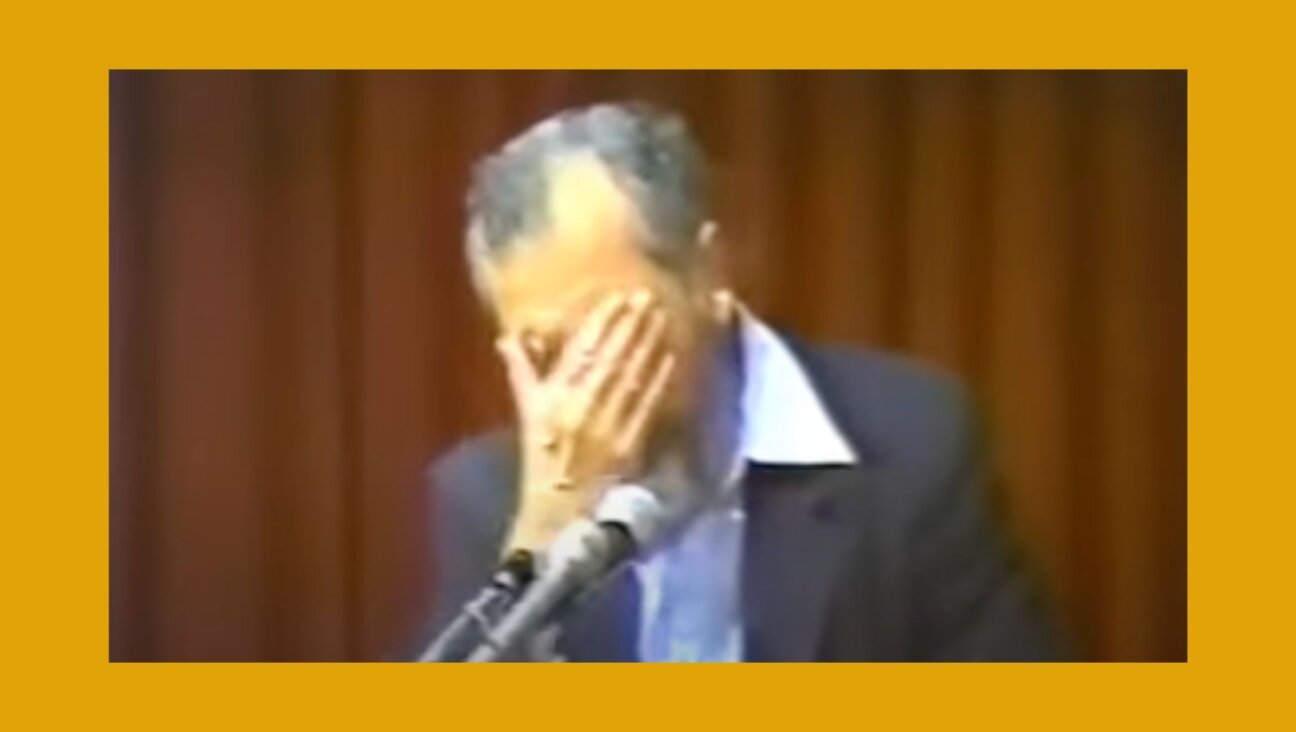‘I’ll struggle with my father for the rest of my life:’ Neshama Carlebach wrestles with the legacy of her father Shlomo and ‘cancel culture’

Heartfelt: Neshama Carlebach sings a haunting (and updated) version of ?Hatikvah.? Image by nate lavey
Neshama Carlebach knows what its like to take heroes off their pedestals.
“I know now the value of pain and being able to look inside,” she said. “What began as the greatest moment of loss in my life, I now see as a rising, and in that rising I can find my real voice.”

Image by nate lavey
As America grapples with what to do about statues and buildings named after men and women with mixed legacies, Carlebach’s experience coming to terms with own famous father’s past resonates.
Two years ago, Carlebach began speaking out about the allegations against her father Shlomo Carlebach and how they’ve affected her personally as well as her career. She returned to these issues in a July 2 Zoom discussion organized by the Cantor’s Assembly, the Conservative movement’s body of cantors.
Although she has spoken about it repeatedly by now, and is writing a book to share her story at a deeper level, it doesn’t get easier, she said. She considered her father her best friend and her musical career was built on keeping him alive through performing his music. But as the survivor of sexual assault herself, with time, she realized she had no choice not only to believe the women who came forward, but to stand in solidarity with them too.
And every time she speaks about it, as she did last week, it is never less fraught.
“I still receive many aggressive messages from people who hate my father and those who love him just a little too much,” she said.
Carlebach said she understood why such a focus on her father continued. It’s especially difficult for her, she said, because people see her as an extension of him. But she said the focus of the Jewish community has to be on the present, not the past.
“I hope and pray that the world’s focus will shift to those who are alive today. I believe our true moments of triumph will come when our communal leaders take more responsibility for their own behavior, both in clergy and in the greater world so their children won’t have to carry their burden,” she said.
Israel’s Consul General Dani Dayan is leaving after four years. What has he learned? He talks to editors-in-chief Jodi Rudoren and Andrew Silow-Carroll, of the Forward and the Jewish Week, about American Jewry’s relationship with Israel. Register here to listen in on July 8 at 12 p.m. ET.
Shlomo Carlebach had a rich musical repertoire, contributing so many melodies used in American synagogues. Many congregants sing his tunes thinking they were traditional or without even realizing they are his. His charisma and openness and warmth and ability to connect with nearly anyone has been credited with guiding many back to Judaism. He was also a great champion of creating more expansive roles for women in Judaism, even though he came from an Orthodox background.

But a 1998 article in Lilith magazine – four years after his death – brought to light that rumors of unwanted sexual advances toward numerous young women had been surrounding him for years. While the Lilith article caused a stir when it was published, it was only when #metoo started that synagogues began to question in earnest whether to continue using his music.
As Jewish Theological Seminary and Hebrew Union College faculty member Cantor Gerald Cohen shared, at some congregations like his, Shaare Tikvah in Scarsdale, N.Y., #metoo prompted a reckoning over his music like nothing before ever had.
After hearing that Manhattan’s Central Synagogue was taking a year-long hiatus from using his music, they decided to follow suit, but not without many painful discussions, Cohen said. During the hiatus, Cohen took it upon himself to offer a class on synagogue melodies and their origins; the hiatus also prompted him to start introducing many new melodies.
When the congregation discussed what should be done after the year was over, it was no easier.
“As we talked about whether to end the hiatus, several families strongly felt we should ban [his songs] permanently, while others felt we had done enough. We decided to bring them back while acknowledging we still have much to do to resolve these underlying issues,” said Cohen.
The issues surrounding Shlomo Carlebach have arisen in other contexts as well. Professor Claire E. Sufrin, assistant director of Jewish Studies at Northwestern University, said her experience co-editing The New Jewish Canon brought her face-to-face with the intensity of “call-out culture.”
She and co-editor Yehuda Kurtzer, president of the Shalom Hartman Institute of North America, decided to include sociologist Steven M. Cohen’s work in their forthcoming book. Cohen resigned from his position at Hebrew Union College in 2018 when several women accused him of sexual harassment.
Sufrin explained it was necessary to include Cohen’s groundbreaking 1990 study on intermarriage because of its influence.
“It was impossible to my mind to understand the American Jewish community of the period without understanding that the 1990 Jewish population study that was interpreted by Cohen and others as prophesizing our demise,” Sufrin said.
That decision caused she and Kurtzer to “find ourselves on the wrong end of call-out culture, which was so horrible and mortifying that I recommend that experience to no one.”
Critics called out the authors publicly, though Sufrin and Kurtzer stood by their choice.
“If we bury his work, we lose the chance to talk about who was paying for these studies and how philanthropies changed their budgets because of them,” Sufrin said. “Is there a relationship between his documented obsession with women having more Jewish babies and this unwelcome pattern of touching Jewish women insubordinates in the field?”
But in regards to Carlebach, she noted that at least when others sing his songs, the songs become as much theirs as his.
Cantor Joanna Dulkin, of Adath Jeshurun in Minnetonka, Minn., was emblematic of the dilemma many like her face.
“I became the cantor I am because of people like Shlomo Carlebach. I became one of those guitar-toting people spreading the love,” she said. “It combines everything I love to do.” She prefaced that by noting that she was a survivor of sexual assault; it happened at Jewish summer camp.
“I had an awakening as a result of my trauma that part of my calling as a clergy person and as a leader is to amplify voices of people like me, saying that it is anyone and everyone. Not only were our abusers people of substance and status, but the survivors are too.”
Did Carlebach think her father’s music should still be performed?
“When it comes to praising God and being close to God every community has to make their own decision,” she said, responding to a Zoom particpant’s question. “Everyone has to find their own way to their highest self.”
Noting that she herself didn’t sing his songs for some time, now she does so with great pride.
“I’ll struggle with my father for the rest of my life,” she said, “but I don’t struggle with the music anymore, because it was a gift.”
The Forward is free to read, but it isn’t free to produce

I hope you appreciated this article. Before you go, I’d like to ask you to please support the Forward.
Now more than ever, American Jews need independent news they can trust, with reporting driven by truth, not ideology. We serve you, not any ideological agenda.
At a time when other newsrooms are closing or cutting back, the Forward has removed its paywall and invested additional resources to report on the ground from Israel and around the U.S. on the impact of the war, rising antisemitism and polarized discourse.
This is a great time to support independent Jewish journalism you rely on. Make a gift today!
— Rachel Fishman Feddersen, Publisher and CEO
Support our mission to tell the Jewish story fully and fairly.
Most Popular
- 1

Fast Forward Ye debuts ‘Heil Hitler’ music video that includes a sample of a Hitler speech
- 2

Opinion It looks like Israel totally underestimated Trump
- 3

Culture Cardinals are Catholic, not Jewish — so why do they all wear yarmulkes?
- 4

Fast Forward Student suspended for ‘F— the Jews’ video defends himself on antisemitic podcast
In Case You Missed It
-

Culture How one Jewish woman fought the Nazis — and helped found a new Italian republic
-

Opinion It looks like Israel totally underestimated Trump
-

Fast Forward Betar ‘almost exclusively triggered’ former student’s detention, judge says
-

Fast Forward ‘Honey, he’s had enough of you’: Trump’s Middle East moves increasingly appear to sideline Israel
-
Shop the Forward Store
100% of profits support our journalism
Republish This Story
Please read before republishing
We’re happy to make this story available to republish for free, unless it originated with JTA, Haaretz or another publication (as indicated on the article) and as long as you follow our guidelines.
You must comply with the following:
- Credit the Forward
- Retain our pixel
- Preserve our canonical link in Google search
- Add a noindex tag in Google search
See our full guidelines for more information, and this guide for detail about canonical URLs.
To republish, copy the HTML by clicking on the yellow button to the right; it includes our tracking pixel, all paragraph styles and hyperlinks, the author byline and credit to the Forward. It does not include images; to avoid copyright violations, you must add them manually, following our guidelines. Please email us at [email protected], subject line “republish,” with any questions or to let us know what stories you’re picking up.
















